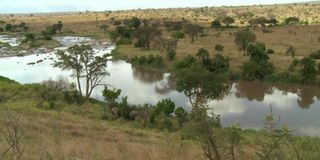Mara River findings: Government team defends report amid criticisms

What you need to know:
- Prof Mayele’s team argues that it released its findings based on the Terms of Reference handed to his unit, as LHRC claims that the report has some flaws as it contracted results by another team
Dar es Salaam. The team of experts formed to probe reasons for the Mara River waters turning blackish and oil with reports of spotting of dead fish yesterday reiterated its findings that no contaminations was discovered.
The team cautioned that they investigated what transpired on February 7, this year based on their Terms of Refence, which did not require them to look on the river’s long term challenges.
The team composed of 11 members including environmental activists announced findings on investigation done for the second time just a few days after another probe team under the Legal and Human Rights Centre (LHRC) revealed its findings. The defending team was formed by Minister of State in the Vice President’s Office (Union and Environment), Mr Selemani Jafo, following reports of changing water colour and spotting of dead fish in the river.
But, yesterday, Vice President’s Office responsible for environment through the chairman of the committee, Prof Samwel Manyele, told a press conference in Dodoma that floods was the cause for Mara River waters turning blackish.
“This is because of the mud it collects which was however not the cause of fish deaths. Rather, they died after being deprived of oxygen,” he said as he clarified concerns and queries from the public.
Prof Manyele, who comes from the Faculty of Chemistry at the University Dar es Salaam (UDSM), said livestock grazing in wetlands accumulated urine and feaces, stressing that the issue did not contribute to fish deaths.
He said his team also found symptoms of oil, which was later found to be relatively harmless and that further investigation discovered that it was a result of decomposition of living organism’s in the wetlands of the Mara River, clarifying that there were no signs on the presence of petroleum.
“The team efficiently fulfilled its responsibilities and involved everyone who was required to participate in the process including experts from different authorities,” he said.
He insisted that his team was not looking for something else other than what happened on February 7, this year that changed appearance of water and led to deaths of fish.
“Other effects are not what we were investigating. What I can say is that the fish and water have not been contaminated, posing no threat to humans,” he said.
The team announced probe report on March 19, 2022 showing that the river pollution was caused by higher levels of animal feaces and decomposition of plants in the river, results that were met with a huge uproar from various quarters.
LHRC was among the critics of the report after releasing its findings showing that there were 300,000 cattle and a total of 160,000 goats and sheep who were the cause of river pollution.
LHRC claimed Prof Mayele’s reported findings were untrue and nothing has been revealed as expected by the public who were curiously waiting for the outcome.
LHRC director Anna Henga said their team of investigation found existence of long-term problems that led to some people suffering from skin diseases and death of a large number of livestock after consuming water from the river.
Earlier in the month, Mr Jafo visited the river and called for an urgent steps to investigate what he witnessed and put things under the control.




